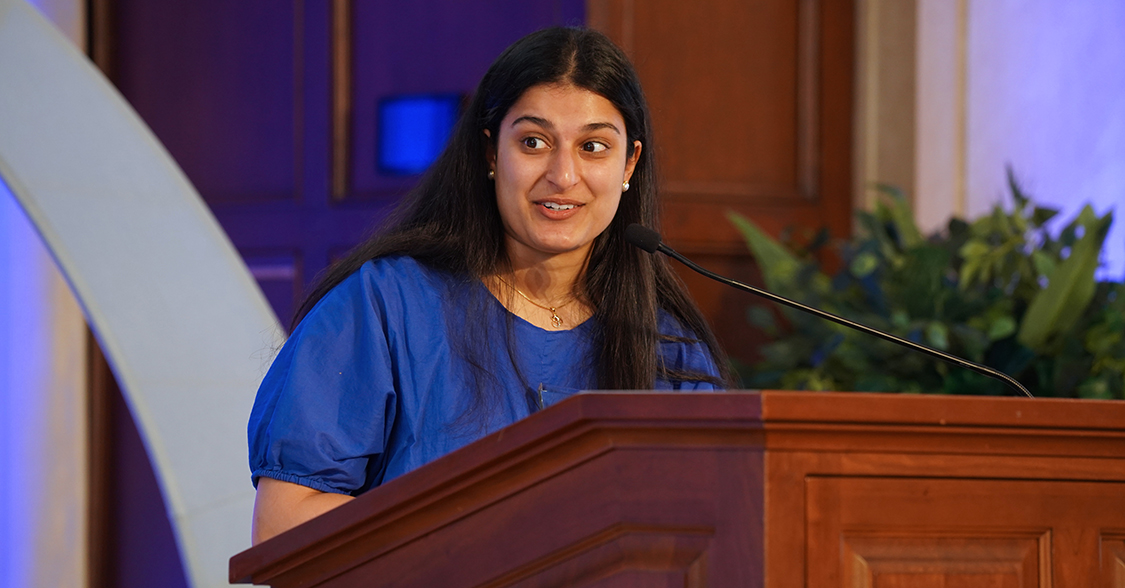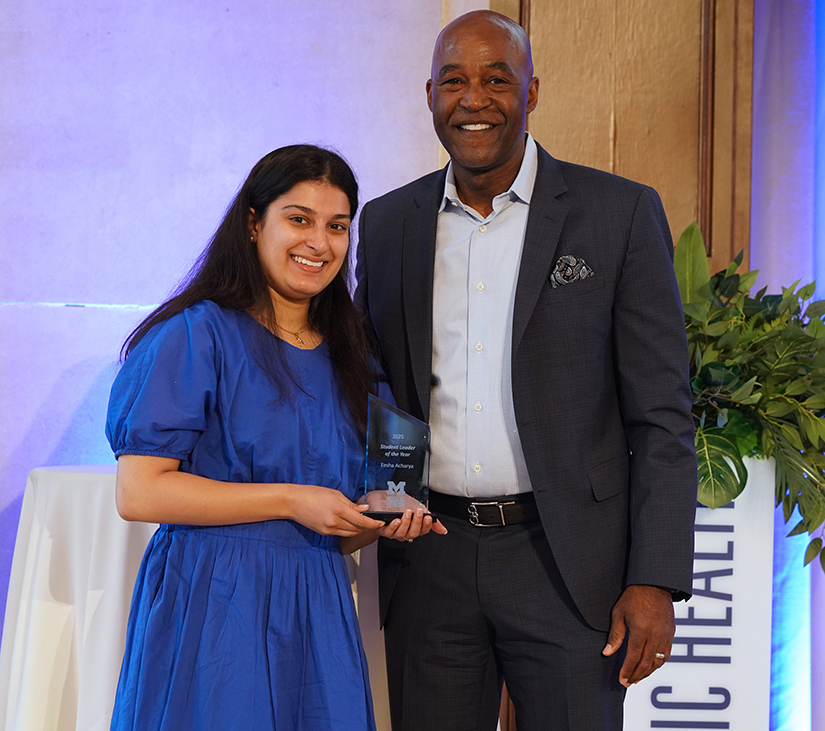Transforming global health through compassionate research

Eesha Acharya, BA ’25
Community and Global Public Health
By Bob Cunningham
Eesha Acharya, BA ’25, wasn’t always confident she could change the world.
Born in Grand Rapids, Michigan, but raised in the small town of Bethany, Connecticut, she was once a nervous out-of-state student who wondered if she’d made the right choice coming to the University of Michigan.
Her path to public health began in an unexpected place: the operating rooms of the Dominican Republic. As a high school student, Acharya joined medical mission trips that would forever alter her understanding of healthcare.
“I remember my first trip. It was just me, a physician, and a resident going to the OR, and I had to learn how to be a circulating nurse as a high school student,” she said.
What Acharya witnessed there was far from the sterile medical environments she’d imagined.
I can't imagine a better school for me. I love Michigan for everything it has to offer.”
“The hallways were just lined with patients on gurneys,” she said. “There was water leaking from the ceiling into buckets in the operating room. I remember one time the power went out during surgery and then came back on.
“Despite the many structural challenges, I felt a deep sense of hope and inspiration watching Dominican doctors give their all for their patients and witnessing the meaningful exchange of knowledge as Dominican and US physicians collaborated, teaching and learning from one another in a truly bilateral partnership.
“I realized I didn’t want to be a doctor. I wanted to make it easier for doctors to be doctors and make it easier for patients to get the care they needed.”
Her father, a University of Michigan alumnus, had always been supportive of her educational choices. When it came time to choose a college, Acharya found herself drawn back to her birth state.
“I knew I wanted to get out of Connecticut,” said Acharya, who earned a Bachelor of Arts degree in Community and Global Public Health from the University of Michigan School of Public Health. “I wanted to try being out on my own, and Michigan seemed like a great opportunity.”
The university quickly became more than just a school—it became home.
“I can't imagine a better school for me,” she said. “I love Michigan for everything it has to offer.”

“Public health is where we want the world to be at,” said Acharya, who was named the Student Leader of the Year at the Public Health Honors event in the spring. “And economics is where it is. Being able to bridge the two to say how we get to where we need to be is so important.”
Her involvement with the Global Health Alliance at the University of Michigan became a cornerstone of her college experience. As co-president, she led projects that made tangible differences both locally and internationally. The club focused on three key areas: supporting its international partner, Green Umbrella, in Cambodia, collaborating with local organizations such as Washtenaw Literacy and Avalon Housing, and providing internal education on critical public health issues.
Acharya also served as the DevEcon Manager for the University of Michigan Institute for Social Research, helping plan the University of Michigan Developmental Economics Conference, which brought researchers nationwide to present current projects and advances in developmental economics.
In addition, she served on the Student Advisory Board, providing feedback to the Dean of Students on issues involving the mental health of students, academic advisors, transportation and political polarization. She also was an undergraduate student representative on the Faculty Senate's Government Relations Advisory Committee, which advises the vice president for Government Relations regarding legislative activities and actions relative to university affairs.
One of her most significant achievements came through a pitch competition for the Center for Global Health Equity. The project that she and Sabrina Yousif, BS ’25, developed addresses a critical environmental and health challenge in Cambodia: open trash burning.
“We want to figure out what is preventing people from using alternative waste disposal methods,” Acharya said. “We know open trash burning is terrible for health, releasing harmful smoke and chemicals that impact food and water.”
Public health is where we want the world to be at. And economics is where it is. Being able to bridge the two to say how we get to where we need to be is so important.”
Her internship experiences further shaped her understanding of systemic change.
At a Connecticut nonprofit, she researched economic development across different racial groups, uncovering critical gaps in data collection. At Deloitte, she worked on Medicaid transformation, helping to create more efficient systems for people with disabilities. She also interned at Poverty Action, where she worked with its Intimate Partner Violence Department on a project that looked into whether soft skills programming with adolescents impacts future intimate partner violence victimization and perpetration.
Despite her achievements, Acharya’s journey wasn't without challenges. The COVID-19 pandemic and shifting attitudes toward public health presented additional obstacles.
“In more recent years, there's just been a lot of negative society attitudes toward public health work,” she said. “It’s been uncertain and scary for my generation.”
But Acharya has been resilient through these challenges.
“The best thing is that you just have to keep doing what you want to do, keep your head up and do your best work,” she said. “That's the only way you can change minds.”
Her approach combines analytical thinking with deep compassion. She sees her work as more than just an academic exercise—it’s about fundamental human connection.
“At the end of the day, we’re all people,” Acharya said. “We should all be helping each other to the best of our capacities.”
Acharya is moving to Washington, DC, to work with Deloitte in federal health services. Her long-term goals are even more ambitious. She hopes to pursue a master’s degree in international development economics, potentially at the London School of Economics, where she studied abroad for the summer of 2022, with the goal of reshaping how global development funds are allocated and utilized.
“I want to show that we can help more people and still be cost-efficient,” she said. “I don’t like this belief that you can only be one or the other. I think research is so important to show and find the best way that we can do that, where we can be as cost-efficient with each dollar that we spend and maximize the number of people that we’re able to help to live happier, healthier and better lives.”
